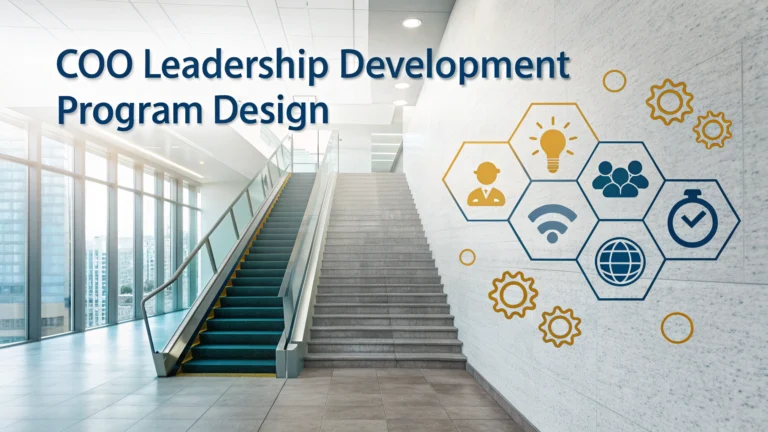A well-designed COO Leadership Development Program strengthens the operational backbone of organizations by cultivating skilled chief operating officers who can drive efficiency, innovation, and sustainable growth.
Successful COO development requires a balanced approach that combines strategic thinking, operational excellence, and leadership capabilities to prepare executives for the complexities of modern business operations.
This guide outlines the essential components of an effective COO Leadership Development Program, incorporating best practices from leading organizations and insights from experienced operations executives.
Core Components of COO Development
- Strategic Operations Management
- Financial Acumen and Budget Control
- Cross-functional Team Leadership
- Change Management and Innovation
- Risk Assessment and Mitigation
- Technology Integration and Digital Transformation
Program Structure and Timeline
| Phase | Duration | Focus Areas |
|---|---|---|
| Foundation | 3-6 months | Operational basics, company systems, processes |
| Advanced | 6-9 months | Strategic planning, leadership skills |
| Mastery | 9-12 months | Executive decision-making, organizational transformation |
Skill Development Focus Areas
Operational Excellence
- Process optimization and efficiency improvements
- Supply chain management and logistics
- Quality control systems implementation
- Performance metrics and KPI tracking
Leadership Capabilities
- Team building and talent development
- Executive communication skills
- Crisis management and problem-solving
- Strategic decision-making
Learning Methods and Resources
- Executive mentoring programs
- Case study analysis
- Rotational assignments
- Action learning projects
- Executive coaching sessions
Measuring Program Success
Key Performance Indicators:
- Operational efficiency improvements
- Cost reduction initiatives
- Employee engagement scores
- Project completion rates
- Leadership effectiveness ratings
Implementation Best Practices
- Align program objectives with organizational strategy
- Secure executive sponsorship and support
- Create individualized development plans
- Establish clear metrics for success
- Regular program review and adjustment
Resources and Support
Contact these organizations for additional program development support:
- National Association of Corporate Directors (NACD): www.nacdonline.org
- Chief Operating Officer Business Forum: www.coobusinessforum.com
- Association for Operations Management: www.apics.org
Taking Your COO Program Forward
Regular program assessment and updates ensure the development program remains relevant and effective in preparing COOs for evolving business challenges.
Program Evaluation Strategies
Continuous assessment of the COO Leadership Development Program ensures its effectiveness and allows for timely adjustments to meet evolving business needs.
Assessment Methods
- 360-degree feedback surveys
- Performance benchmarking
- Operational metrics analysis
- Participant progress tracking
- Stakeholder interviews
Scaling and Customization
Adapt the program structure based on organizational size, industry requirements, and specific business challenges.
- Industry-specific modules
- Company culture alignment
- Market-specific considerations
- Resource availability
- Growth trajectory alignment
Risk Management and Mitigation
Address potential challenges in program implementation and participant development through proactive planning.
Common Challenges
- Time management constraints
- Resource allocation
- Stakeholder buy-in
- Measuring ROI
- Program sustainability
Future-Ready COO Development
A robust COO Leadership Development Program creates resilient operational leaders equipped to navigate complex business landscapes and drive organizational success.
- Stay current with industry trends
- Embrace technological advancement
- Foster innovation culture
- Build sustainable practices
- Develop global perspective
Empowering Operational Excellence
The success of modern organizations increasingly depends on capable COOs who can balance strategic vision with operational expertise. A well-structured development program provides the foundation for building these essential leadership capabilities, ensuring organizational resilience and sustainable growth in an ever-evolving business landscape.
- Commit to continuous improvement
- Foster collaborative leadership
- Drive organizational transformation
- Build lasting operational excellence
FAQs
- What is a COO Leadership Development Program?
A structured training initiative designed to develop the skills and competencies needed for current or aspiring Chief Operating Officers, focusing on operational excellence, strategic planning, and executive leadership capabilities. - What are the key components of an effective COO Leadership Development Program?
The program typically includes strategic decision-making, operational management, financial acumen, organizational leadership, change management, risk assessment, and cross-functional team leadership. - How long does a typical COO Leadership Development Program last?
Programs generally range from 6 months to 2 years, depending on the organization’s needs and the depth of training required. Some programs offer modular approaches that can be completed while working. - What qualifications are required to enroll in a COO Leadership Development Program?
Most programs require candidates to have significant management experience (typically 7-10 years), demonstrated leadership abilities, and often an advanced degree such as an MBA or equivalent business experience. - How does mentorship factor into COO Leadership Development Programs?
Mentorship is usually a core component, pairing participants with experienced COOs or senior executives who provide guidance, share experiences, and offer practical insights into the role’s challenges. - What skills are prioritized in COO Leadership Development Programs?
Key skills include strategic planning, operational optimization, financial management, leadership development, crisis management, digital transformation, and stakeholder management. - How do organizations measure the success of a COO Leadership Development Program?
Success is measured through participant performance metrics, leadership competency assessments, successful project implementations, and the rate at which participants advance into senior operational roles. - What role does cross-functional exposure play in COO development?
Cross-functional exposure is essential, typically involving rotational assignments across different business units to develop a comprehensive understanding of various operational aspects and their interdependencies. - How does technology integration factor into modern COO development programs?
Modern programs incorporate digital transformation strategies, data analytics, automation technologies, and digital operational tools to prepare leaders for technology-driven operational environments. - What types of practical experiences are included in COO development programs?
Programs typically include action learning projects, operational simulations, real-world problem-solving scenarios, and leadership of major organizational initiatives.
